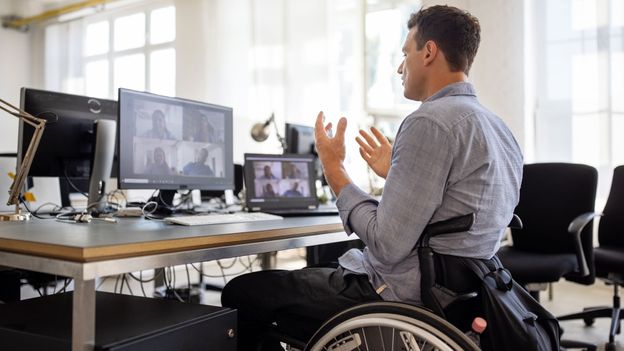Wortman Ploetz says many who know her might be surprised that she describes herself as an introvert. She spends a lot of time in meetings and hands-on training sessions, but ultimately, she says, “where I draw my energy from is being in a quiet place, alone”.
Neuroscience helps back up the theory. Studies show extroverts are less sensitive to dopamine, and thus require a lot of stimulation to be sufficiently energised. Introverts are far more sensitive to the brain chemical, and over-stimulation can quickly become tiring.
In general, adds Buelow, introverts pay a price for each social interaction throughout the day. That cost dipped considerably with the shift to remote work. “They’re not recharging when they’re in the office and stimulated all the time,” she says. “Just by virtue of having the solitude at home, you have more opportunities, more balance. Your alone to social time ratio is much healthier.”
Etienne considers himself a more introverted person. Like Wortman Ploetz, he says he’s ultimately become more productive while working from home.
“I felt more in control of the management of my time,” he says. “For example, I think we’ve all been through this: you finish a meeting and you’re walking back to your desk and someone spots you and you have a conversation. And you lose the time to process the meeting you’ve just finished, and reset. That doesn’t happen anymore. Now, I can have my moment of reflection in silence, without disturbance. With things like Zoom and Teams there are even ‘do not disturb’ settings; you literally can’t message me.”
Playing to an introvert’s strengths
Beyond providing more peace and quiet, the new, introvert-friendly work environment made space for those personalities to stand out in other ways.
“The physical meeting table disappeared, and with it went the hierarchical structure of the loud people gathered together at the centre and the introverts on the fringes,” says Etienne. And, he adds, those who might have been hesitant to jump into the fray in a conference room were empowered by virtual meeting spaces.
“If one has a fear of public speaking, working remotely allowed that person to speak to their expertise, maybe even to thousands of people, but they’re just seeing a green light at the top of their laptop screen,” he says.











